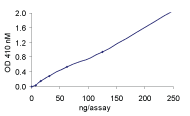
PTPN2 (TC-PTP), Active(P29-20G)
FOR BULK ORDER REQUESTS PLEASE CONTACT US
Description :Recombinant full length human PTPN2 was expressed in E. coli cells using a N-terminal GST tag.
Species :Human
Tag :GST tag
Expression System:E.coli
Sequence :Full Length
Genbank Number :NM_080422
Specific Activity :Sample Enzyme Activity Plot. For specific information on a given lot, see related technical data sheet.
Purity :Sample Purity Data. For specific information on a given lot, see related technical data sheet.
Storage, Stability and Shipping :Store product at –70oC. For optimal storage, aliquot target into smaller quantities after centrifugation and store at recommended temperature. For most favorable performance, avoid repeated handling and multiple freeze/thaw cycles.
Applications :Phosphatase Assay, Western Blot
Molecular Weight :~69 kDa
Gene Aliases :TC-PTP, PTPT, TCELLPTP, TCPTP
Scientific Background :Protein tyrosine phosphatase, non-receptor type 2 (PTPN2), is one of the most abundant mammalian tyrosine phosphatase. The protein encoded by this gene is a member of the protein tyrosine phosphatase (PTP) family (1). By virtue of protein tyrosine phosphatase activity, PTPN2 is known to be a signaling molecules that regulate a variety of cellular processes including cell growth, differentiation, mitotic cycle, and oncogenic transformation involved in cell communication and signal transduction (2).
References :
1. Gupta, S. et al: A nuclear protein tyrosine phosphatase activates p53 and induces caspase-1-dependent apoptosis. FEBS Lett. 2002; 532(1-2):61-6.
2. Yamamoto, T. et al: The nuclear isoform of protein-tyrosine phosphatase TC-PTP regulates interleukin-6-mediated signaling pathway through STAT3 dephosphorylation. Biochem. Biophys. Res. Commun.
Product Sheets (By Lot #) :
Research Areas :Neurobiology, Inflammation, Metabolic Disorder, JAK/STAT Pathway, Phosphatases, Cancer, Inflammation, Metabolic Disorder, JAK/STAT Pathway, WNT Signaling, Invasion/Metastasis, Phosphatases
